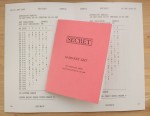
I’ve just released version 2013-04-28a of my command-line M-209 simulator. The major addition to this release is a new Python script which generates key lists with daily scheduled key changes. The generated key list collections include 365-366 plain-text key files which may be read, printed or loaded into my simulator, and plain text key lists for each month which may be viewed or printed. Also, if TeX typesetting software and some other related utilities are available, various PDF key lists will be generated for on-screen viewing or printing into either small or large booklets. Please note that I’ve changed the version numbering from the old major.minor format to a date-based format.
